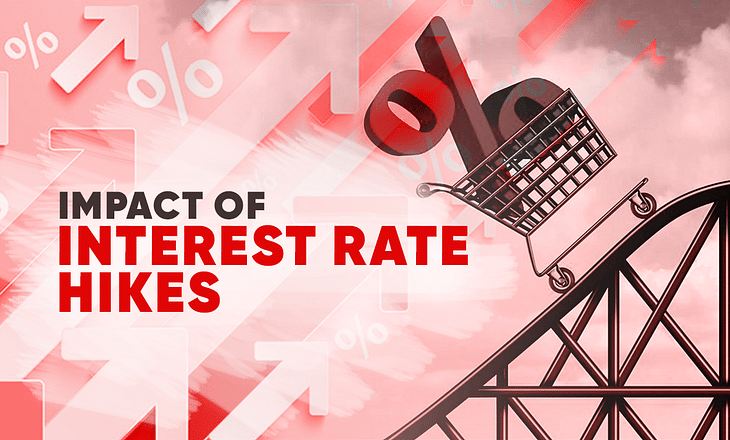The Impact of High Inflation and Interest Rates Hikes

The reports of interest rate hikes by the Federal Reserve of the United States have spooked stock market investors across the globe. Many have speculated that such an action by the US Fed will encourage other nations to hold a hawkish stance to keep inflation in check. However, such a move might eventually result in a global stock market crash!
In this article, we shall go through the factors behind interest rate hikes and find out whether we really need to fear this decision.
The Story
Firstly, let us understand the basic macroeconomic concept of a business cycle. Businesses and the economy as a whole don't move in a straight line. There are expansions and contractions in the economy (like ups and downs in a wave). As the economy expands, the long-term trend of these waves is always in a positive bias.
As a result of the economic contraction due to the COVID-19 pandemic, it was essential for governments and central banks of each country to expand their economy. So, they boosted their economy with incredible stimulus packages and low repo rates. Repo rate is the interest rate at which central banks (like the Reserve Bank of India and the Federal Reserve of the US) lend to commercial banks.
Businesses and individuals were able to avail packages and obtain loans easily. As the global economy started to revive with higher vaccination rates, the gross domestic product (GDP) of countries rebounded, and unemployment reduced drastically. Citizens started to spend more on products and services, as they were now fueled with more cash in their pockets. However, the suppliers could not keep up with the high demand! As the demand side skyrocketed, the supply side was broken. Supply chains were unable to satisfy the existing demand, which led to inflation. (Click here to read more about inflation).

In the graph shown above, you can see the impact of inflation in the US. It has hit a 40-year high. The inflation rate in December 2021 was 7% compared to the previous year. Let us look at the inflation rates of other countries.

We are now at the end of the expansion stage, and the economy is growing too fast. On the other hand, stock markets have rallied multifold and are at high valuations as inflation started to spread. If inflation is not controlled, the economy will quite literally collapse.
How do governments solve this issue? Here is where the monetary power of the central banks comes into the picture. The Federal Reserve can now increase the interest rates that were once decreased in the contraction period. Moving forward, it will be difficult for industries and individuals to avail loans. This move will lead to a decline in money flowing into the economy. Eventually, inflation will drop.
Effects on Stock Markets
Investors value stocks by the earnings they are likely to obtain in the future. For example, many have invested in highly valued startup companies like Nykaa, Paytm, and Zomato with the intention that they are disruptors in their respective fields. Moreover, these firms will be coming up with better sales and earnings in the future.
An increase in interest rates will lead to less liquidity among people. They will start to spend less and cut short their expenses, which ultimately affects the sales of companies. So the valuation of the companies will come under question, and investors will have a bearish sentiment on these stocks. Thus, any sectors that were valued with future earnings have a high risk when interest rates are hiked.
Conclusion
If not controlled, inflation can erode the wealth of a nation. Indeed, the action by the US Federal Reserve will create short-term money constraints in the economy. However, it will fuel greater expansion in the long term.
After the release of the minutes of the US Federal Reserve’s December policy meeting (click here to read about Fed minutes), the NASDAQ index of the US, in which tech stocks have high weightage, fell more than 7% to date. However, the Indian markets did not move down as much.
Moving forward, we will be able to see similar actions from the Reserve Bank of India (RBI) that may shake the Indian markets. Stocks of highly consumer-centric companies and tech firms could fall into a short-term bearish phase as their sales/earnings projections (to which their current valuation is tied up) would fall.
What are your views on the hike in interest rates? Do you think it will affect our markets severely? Let us know in the comments section of the marketfeed app.


Post your comment
No comments to display